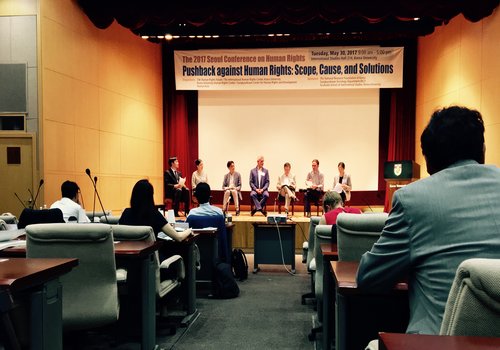Scholars from around the world recently convened for the 2017 Seoul Conference on Human Rights hosted by Korea University, and discussed the current state of human rights across the globe.
The 2017 conference was organized by the SSK Human Rights Forum and sponsored by the National Research Foundation of Korea, marking the seventh consecutive event of its kind and the largest since it became international in 2013. The conference has primarily sought to promote the importance of social sciences research into human rights.
The beautiful weather outside belied this year’s theme and ominous header, “Pushback against Human Rights: Scope, Cause, and Solutions.” A worrying phenomenon called “pushback against human rights,” has emerged, referring to a related set of events and developments that have substantially weakened the legitimacy of universal human rights over the last decade. The conference sought to attract human rights scholars from diverse backgrounds to share and critique each other’s views on the issue.
The panel included twenty-five scholars, comprising thirteen guest lecturers from both Korean and North American universities. The audience comprised yet more scholars, human rights activists, and, most notably, numerous students. The day saw a wide array of topics covered, ranging from LGBT and women’s rights to business responsibilities, educational opportunities and environmentalism. The string of lectures, which only broke for lunch and the occasional coffee break, ultimately ran nearly an hour over time for a total of nine hours.
Several lectures addressed North Korean human rights issues.
Dr. Amanda Murdie, Professor of International Affairs at the University of Georgia, spoke on the importance of civil society to human rights. Dr. Murdie defined civil society as a non-state, non-business space for activism wherein domestic activists can build a base, even in the presence of a repressive regime. She went on to highlight the use of international advocacy, or an appeal for support to powerful third-parties such as liberal states and transnational NGOs, which can pressure repressive regimes into improving the status of human rights under their jurisdiction. She pointed out that there was currently unequal coverage of human rights issues in the world and that the regions that tended to be neglected suffered from poor systems of information dissemination.
Dr. Evan Schofer, Professor of Sociology at the University of California, Irvine, agreed on the importance of civil society, and argued that the key to expanding civil society was universities and higher education. He elaborated that universities served as globally-connected “receptor sites” for world cultural norms and principles, nurturing professionals and empowering increasingly “cosmopolitan” citizens and ultimately propelling political movements and social change.
Directly relevant was Dr. Taehee Whang’s talk on the unintended effects of economic sanctions on a target country’s disaster preparedness. Dr. Whang, Associate Professor and Chair of Political Science and International Studies at Yonsei University, stressed the wide-ranging consequences of economic sanctions on countries with repressive regimes. He explained that sanctions inflict costs indirectly through the reallocation of government spending from low to high priority spending categories when under pressure. He further elaborated on this effect using North Korea as the example, arguing that the authoritarian regime would sooner sacrifice its people’s well-being before its nuclear program, if faced with sanctions. This includes sacrificing disaster preparedness and education.
As the ominous header suggested, the conference took several rather pessimistic turns. For instance, Shannon Green of the Center for Strategy and International Studies explained the recent trend she has labeled “the deconsolidating of democracy.” Extremism, populism and authoritarianism appear to have risen in places that were once considered consolidated democracies, and millennials around the world have reportedly lost faith in their institutions. Moreover, there is an apparent gap in research into the red flags that are indicative of such deterioration of norms.
Yet there were equally as many moments of optimism as well. Dr. Christopher Farris, Assistant Professor of Political Science at the University of Michigan, cautioned against taking global indices at face value. Dr. Farris argued that numbers alone can be misleading if one lacks a critical understanding of the process by which the data is collected. In fact, several indices would suggest that human rights have consistently and undeniably improved over the last half century, citing fewer state sanctioned killings and cases of torture and greater domestic prosecutions of state agents. Perhaps most palpably, Dr. Farris pointed out how unlikely South Korea would have been to host an international conference on human rights just thirty years ago. He noted, “Who is to say that a similar conversation won’t take place thirty years from now; someplace unexpected and not so far from here? In that sense, it [human rights] is not all for nothing.”
Dr. Changrok Soh, Professor and Director of the Human Rights Center at Korea University, shared a similarly optimistic outlook in his closing remarks. He proclaimed, “I believe that the pushback [against human rights] is a temporary one. Slow progress is progress all the same.” The 2017 conference concluded on a convivial, yet resolute note. What the next several decades will achieve in the way of human rights in North Korea now remains to be seen.


















